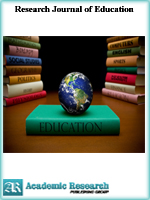Research Journal of Education
Online ISSN: 2413-0540
Print ISSN: 2413-8886
Print ISSN: 2413-8886
Quarterly Published (4 Issues Per Year)

Archives
Volume 2 Number 9 September 2016
Proposed Essay Writing Component for EFL Students at Tertiary Level
Authors: Omer Elsheikh Hago Elmahdi
Pages: 152-158
Abstract
This paper aims at taking university-level EFL students with an intermediate ability in English as a foreign language from paragraph writing to essay writing. The main idea in this paper is to propose the essay writing skills of EFL students. It proposes writing component that provides a complete picture of developing an essay writing process for EFL students at tertiary level. It also, reveals the objectives of essay writing, the contents, the theoretical aspects, practical aspects, the academic writing layout, and finally, the suggested writing textbooks.
Influence of Teen Contraceptive Use on Academic Achievement among Public School Students in Bungoma South Sub-County
Authors: Negesa Justine V. ; Wesangula M. P. ; Opiyo A. R.
Pages: 145-151
Abstract
The adolescent stage is a period of turmoil marked with enormous vibrancy, discovery, innovation and hope and also the time when many of them initiate sexual relationships and involvement. This can be a challenging time for young people who are becoming aware of their sexual and reproductive rights and needs, and who rely on their families, peers, schools, media and health service providers for affirmation, advice, information and the skills to navigate is sometimes a difficult transition to adulthood. The subject on sex has been surrounded by mystery and beclouded by dark silence as neither parents nor teachers are ready to discuss it with teenagers despite unplanned pregnancies, dropping out of school by students, Sexually Transmitted Infections among teenagers. The study investigated influence of teen contraceptive use) on academic achievement among public secondary school students in Bungoma South Sub-County, Kenya. The study adopted Albert Bandura’s Social Cognitive Theory postulated in 1986. A descriptive research design was used with target population of 3774 Form 3 students. A sample of 400 students was selected using, Miller, L.R. & Brewer, J.D. (2003) mathematical formula and stratified randomly from 52 schools and conveniently selected equally between boys and girls. Data was collected using structured interview schedule and questionnaire and analyzed descriptively. Results highlights most students were aware about contraceptive use with females slightly more than males and media was the major source of information on contraceptive use while parents/guardians had no significant contribution since teenagers rarely receive their first information on sexual matters from their parents. More than half of the sexually active students used contraceptives though it still interfered with their academic performance. This paper points at sex education curriculum in schools, setting up reproductive health institutions for the youth and distribution of contraceptives among teenagers which has a bearing on students’ performance.



